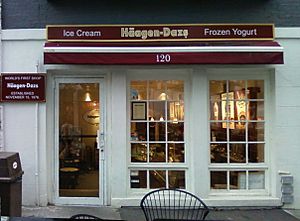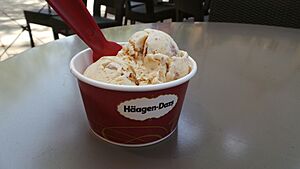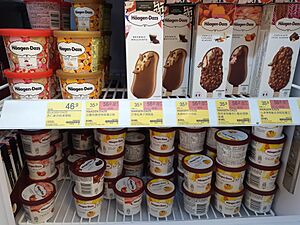Häagen-Dazs facts for kids
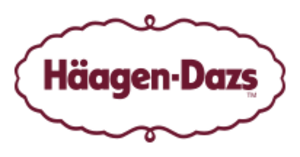 |
|
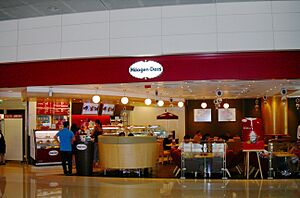
|
|
| Subsidiary | |
| Industry | Retail Franchising |
| Founded | 1960 in Bronx, New York, U.S. |
| Founder | Reuben and Rose Mattus |
| Headquarters | Minneapolis, Minnesota, U.S. |
|
Number of locations
|
900+ |
|
Area served
|
Worldwide |
| Products | Ice cream |
| Owners |
|
Häagen-Dazs is a famous American ice cream brand. It was started by Reuben and Rose Mattus in the Bronx, New York, in 1960. Today, it is owned by Froneri, a company that is a partnership between Nestlé and PAI Partners.
When it first began, Häagen-Dazs only offered three flavors: vanilla, chocolate, and coffee. The very first Häagen-Dazs store opened in Brooklyn, New York, on November 15, 1976. Later, in 1983, a big food company called Pillsbury bought Häagen-Dazs. Now, you can find Häagen-Dazs products all over the world. They sell many different treats, including ice cream in cartons, ice cream bars, ice cream cakes, sorbet, frozen yogurt, and ice cream sandwiches.
Contents
The Story of Häagen-Dazs
Reuben Mattus, one of the founders of Häagen-Dazs, was born in Poland in 1912. When he was young, his father passed away during a big war. In 1921, his mother moved to New York City with her two children. They joined an uncle who made Italian lemon-ice in Brooklyn.
By the late 1920s, Reuben's family started making ice pops. By 1929, they were making chocolate-covered ice cream bars and sandwiches. They sold these under the name Senator Frozen Products. They delivered their treats to local stores in the Bronx using a horse-drawn wagon.
Their company, Senator Frozen Products, was doing well. However, in the 1950s, larger ice cream companies started selling their products at very low prices. This made Reuben decide to create a special, high-quality ice cream. In 1959, he started his new ice cream company. He wanted a name that sounded Danish, so he chose Häagen-Dazs. He picked this name to honor Denmark because of how well they treated Jews during World War II. This way of naming a product is called "foreign branding" in marketing. Reuben's wife, Rose Mattus, helped by dressing up nicely and giving out free samples. This made the ice cream seem fancy and special.
In 1983, Pillsbury Company bought Häagen-Dazs. Later, in 1999, Pillsbury and Nestlé combined their ice cream businesses in the U.S. and Canada. This new company was called Ice Cream Partners. In 2001, General Mills bought Pillsbury and took over its share in Ice Cream Partners. That same year, Nestlé bought out General Mills' share. This gave Nestlé the right to use the Häagen-Dazs brand for 99 years. Since then, Nestlé's company, Dreyer's, has made and sold Häagen-Dazs products in the United States and Canada. In December 2019, Nestlé sold Dreyer's and its rights to the Häagen-Dazs brand to Froneri. Froneri is a company Nestlé started with PAI Partners in 2016.
Why the Name "Häagen-Dazs"?
The name "Häagen-Dazs" was made up by Reuben Mattus. He wanted a name that sounded Danish. However, the name doesn't actually mean anything in Danish or any other known language. For example, the letter "ä" and the letters "zs" are not used in Danish.
Reuben Mattus said the name was a way to honor Denmark. He admired how Denmark helped its Jewish people during the Second World War. Early Häagen-Dazs labels even had a small map of Denmark on them. Mattus also thought Denmark was known for its good dairy products. His daughter, Doris Hurley, once shared that her father would sit at the kitchen table for hours. He would say made-up words until he found a combination he liked. He chose this method so the name would be truly unique and original.
More About the Name
Around 1988, Reuben Mattus gave a talk about how he built his company. He explained that he used to sell ice cream to candy stores. One store owner told him his ice cream wasn't very good. After that, Reuben spent a lot of time researching ice creams and ingredients in the library. He decided to make the very best ice cream. He used special ingredients like rum from Boston and chocolate from Belgium. He wanted his new product to stand out with an exotic-sounding name like Häagen-Dazs.
He also packaged the ice cream in round containers, which was new at the time. Grocery store owners complained that fewer round containers fit in their freezers. But Reuben explained that what mattered was how many people bought the ice cream, not just how many could be stored. He also said he always used "honest numbers" for prices, like $1.00 or $1.25, instead of $0.98. This was also to show the quality of his product.
A Brand Name Challenge
In 1980, Häagen-Dazs tried to sue another American ice cream company called Frusen Glädjé. Frusen Glädjé also used a foreign-sounding name. The name "Frusen Glädjé" means "frozen joy" in Swedish. Häagen-Dazs did not win this lawsuit. In 1985, Frusen Glädjé was sold to Kraft General Foods. The brand was later stopped and is no longer sold.
Häagen-Dazs Products
Häagen-Dazs ice cream comes in many flavors. Some are classic, like vanilla, while others are unique to the brand, like Vanilla Swiss Almond and Bananas Foster. It is known as a "super-premium" brand. This means it is very dense, with little air mixed in during making. It also has a high amount of butterfat and uses only egg yolks as a natural thickener. You can buy Häagen-Dazs in grocery stores. They also have special stores where you can get ice cream cones and sundaes.
Since 1992, most Häagen-Dazs products around the world have been made in a factory in France. This factory is now controlled by General Mills. In the United States and Canada, Häagen-Dazs is made by Froneri. Häagen-Dazs started selling in Japan in 1984. They partnered with Suntory and Takanashi Milk, who have made their products there ever since. The factory in Japan is located in Takasaki, Gunma Prefecture.
To help with rising costs, Häagen-Dazs changed the size of their pint ice cream cartons in the US in January 2009. They went from 1 US pint (16 US fluid ounces) to 14 US fluid ounces. In March 2009, they also announced that their quart cartons would change from 1 US quart (32 US fluid ounces) to 28 US fluid ounces.
See also
 In Spanish: Häagen-Dazs para niños
In Spanish: Häagen-Dazs para niños
 | Roy Wilkins |
 | John Lewis |
 | Linda Carol Brown |


